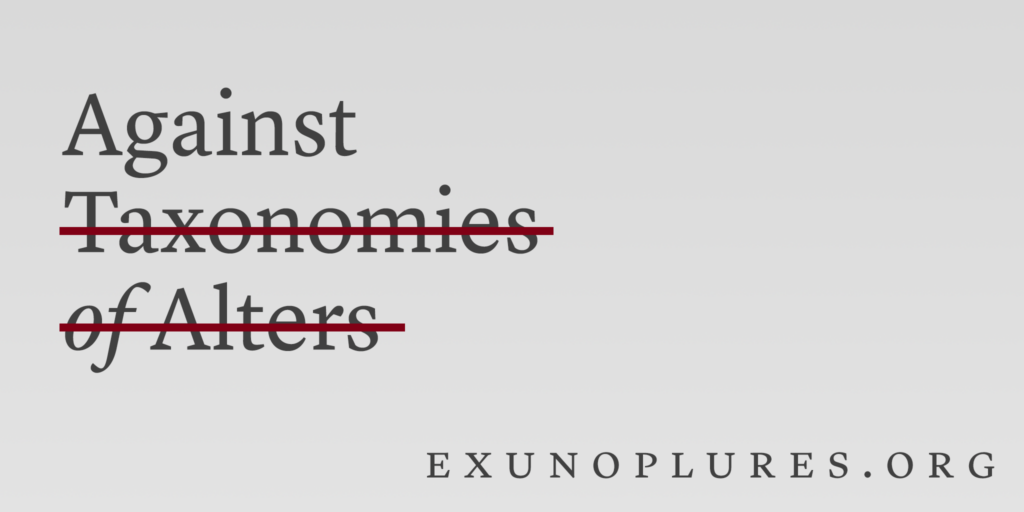Lilly Ghia-Wilberforce, 2013. Significantly revised on 28 November 2023.
Old-fashioned medical literature about multiplicity, as well as plurals’ online essays, often classify headmates (though they usually call them “alters” or “personalities”) based on the roles they play—for example, the trembling child, the sex-loving alter who doesn’t know how to use a condom, the wise inner self-helper, the fierce protector, or the relentless persecutor alter. (We make fun of those stereotypes in our audio play “Only Meteors Are Impactful”!) These taxonomies come from the idea that everyone in the system was created to fulfil a specific role after a core-self split because of trauma or abuse. Unfortunately, people sometimes misapply these classifications to all kinds of systems, whether their experience fits the Dissociative Identity Disorder model or not.
The problem with alter taxonomies
Even for systems who came to being through trauma, these descriptions can be limiting and offensive, since they turn everyone into two-dimensional caricatures regardless of how complex someone in a system might be. Most of us have detailed biographies, tastes, ideas, political beliefs, cultural outlooks, and perceptions—we’re far from cardboard cut-outs. Even in systems that do see themselves as parts of a core self, often fragments or aspects, it’s usually less theatrical than what the alter taxonomies suggest. Some systems may feel the need to describe their headmates using these flattened classifications because that’s what their therapists do, or it’s what they see in the media, or it’s what they encounter in peer support communities. “This person can remember a lot of things that happened to the system, so they must be the memory keeper!” “This one gives good advice, so he must be the inner self-helper!” “This one is a kid, so she must be the scared little!”
Growing beyond stereotypes
Having connections to trauma doesn’t mean that you have to label everyone in your system as persecutors, inner self-helpers, protectors, or scared littles. We think that we were born with a propensity to plurality, but that trauma influenced our composition and, yes, our jobs. But we’re not limited to specific functions—each of us has the same range of skills and abilities that your average person does. Vova is good at accessing memories and making connections between in-system events, ideas and people that the rest of us haven’t been able to do, but that doesn’t make him an “inner self-helper.” He’s got his own limitations, including a short temper. When I was younger, I wasn’t a trembling “scared little”; I was an intellectually curious child who was ready to take on life’s challenges… but I was too young to do very much, so my parents, brother, and other headmates had to keep an eye out for me.
When it comes down to it, we’re just people. We’re all the inner self-helper. And I think everyone feels like the scared little whenever they’re remembering something traumatic that they couldn’t escape. We all want to protect each other. These jobs can overlap; they don’t need to be compartmentalised within a single headmate.
And even if the members of a system started off with specific functions like the inner self-helper, persecutor, protector, or even the evil demon alter, that doesn’t mean they’re doomed to stay that way for life. Someone who may have begun their existence as a protector could ultimately discover their own interests, motivations, tastes, and sense of purpose independent of their original need to protect the rest of the system. I know several systems where that’s the case: they recognise their roots in trauma, but they’ve come into their own and added more texture to their lives.
